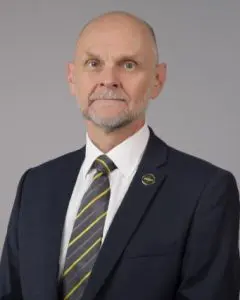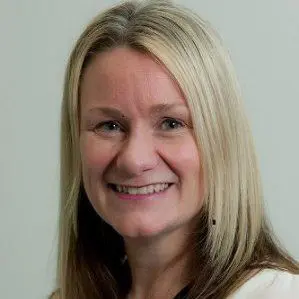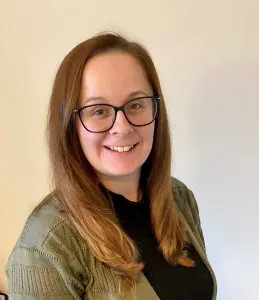Sustainability and climate action in the built environment: a UCEM panel
Posted on: 13 June, 2024

Several members of staff at UCEM took part in a panel discussing the institution’s role in sustainable education and governance. Here’s what they had to say.

On Tuesday 23 April, UCEM hosted a Q&A session as part of Climate and Social Action Week (CASA) – a series of online and hybrid events diving into topics around sustainability and climate action.
This panel was open to questions from the audience, providing an opportunity for students, alumni and employees to engage with several members of UCEM staff and ask for their perspective on what UCEM is doing to make a difference in the battle against climate change.
The Q&A was hosted by Donna Modesté, Assistant Quantity Surveyor at Equans, BSc Quantity Surveying student and Student Officer for Sustainability at UCEM.
Among the panel were:
- Ashley Wheaton, Vice Chancellor at UCEM
- Dr James Ritson, Senior Lecturer at UCEM
- Kathy Matthews, Head of Facilities Management at UCEM
- Charlotte Thackeray, Outreach and Inclusion Lead at UCEM
- Jessica Gordon-Calvert, Sustainability Education & Engagement Officer
Q: How is UCEM positioning itself as a leader in the built environment that stands out from other higher education institutions?
 James: The built environment has a legacy where it hasn’t thought about sustainability as part of its embedded nature – we build something, we construct something, we change something, and then sustainability is just something we comply to.
James: The built environment has a legacy where it hasn’t thought about sustainability as part of its embedded nature – we build something, we construct something, we change something, and then sustainability is just something we comply to.
Now, we’re shifting towards embedding it in what we do and everything that we say. It’s not just about measuring our carbon emissions, ticking a box and moving on – it’s actually in areas that we can’t measure accurately yet, but we know are so important, like social sustainability and economic viability. How do you begin to measure the social impact of developments, and things like that? And so actually embedding it as part of all of our modules at UCEM and understanding that we have far reaching consequences is the first step, really, to differentiating ourselves.
I don’t know of any other university that has made such an ambitious set of goals as ours – in fact, I don’t think we can be any more ambitious than our aspiration of being the most sustainable university.
 Ashley: A couple of years ago, we set out to launch a series of events called INSPIRE. Last year, we brought together a large number of people from different parts of the built environment to discuss the topic of sustainability. We did this not just to play out part in what we do, but also to bring interested parties together to have a discussion, amplify voices and extend their influence.
Ashley: A couple of years ago, we set out to launch a series of events called INSPIRE. Last year, we brought together a large number of people from different parts of the built environment to discuss the topic of sustainability. We did this not just to play out part in what we do, but also to bring interested parties together to have a discussion, amplify voices and extend their influence.
We’re also pushing very hard on the professional bodies to make sure they’re going at the right pace, getting the right accreditations, the right competencies and the right professional roles in place. Then of course there’s partnerships – we’re working very closely with organisations like the UK Green Building Council and the Supply Chain Sustainability School, to name but two, recognising that collaboration here is the fastest route to solving this enormous problem rather than trying to solve it all on our own.
Learn more: Adopting a sustainability lens in everything we do – a Q&A with UCEM Vice Chancellor Ashley Wheaton
Q: What successes have UCEM had and what challenges have we faced, and how did we overcome them?
 Kathy: Earlier this year we received an ISO 140001 certification in environmental standards. This is our first international standard, our first ISO, and was a huge success for us.
Kathy: Earlier this year we received an ISO 140001 certification in environmental standards. This is our first international standard, our first ISO, and was a huge success for us.
The challenge was definitely working out where we have an impact and what we needed to be concentrating on regarding emissions. The fact that we aren’t a traditional university pressures us to think differently about how we operate – we aren’t bricks and mortar and we are online, so Scope 3 emissions (emissions not produced by us ourselves but by those we’re indirectly responsible for up and down our value chain) account for about 96% of our total emissions.
Scope 3 emissions are the hardest to influence, so we have to ensure we’re nurturing our relationships with suppliers and making sure they’re able to play their part. That’s going to be our next challenge going forward – addressing the emissions we don’t have direct control over.
Q: What is the most effective way to exchange ideas and good practice across UCEM communities to ensure everyone gets inspired and tries new things?
 Jessica: It’s important to connect with different styles of learning and also confidence levels, and also in terms of time and experience and taking all of this into consideration when engaging with our communities. This could be done through additional training opportunities, such as the energy and carbon training module we launched for staff. It could also be through formal webinars and discussions related to our programme offerings, along with games and competitions.
Jessica: It’s important to connect with different styles of learning and also confidence levels, and also in terms of time and experience and taking all of this into consideration when engaging with our communities. This could be done through additional training opportunities, such as the energy and carbon training module we launched for staff. It could also be through formal webinars and discussions related to our programme offerings, along with games and competitions.
It’s important that we connect an element of fun to this as well. When it comes to sustainability, far too often people get bogged down in the doom and gloom nature of it, so it’s crucial that we’re providing safe spaces to share ideas and experiences. We don’t want to guilt or shame individuals for making choices – we want somewhere where we can freely discuss what has and hasn’t worked for us and, ultimately, where we can change our practices, whether that’s at work, at university or in our daily lives.
Q: What are we doing to continue to influence students on sustainability once they’ve finished their studies?
 Charlotte: It’s about continuous education – making sure people are continuously refreshed with new ideas, because there’s always so much innovation and research coming out in the sector. When students are looking to progress in their careers, they’re increasingly looking at sustainable roles in sustainable companies – they want to work for employers that are really looking to take things forward and make an impact. At UCEM, we have the opportunity to give them the education about who’s doing good work in the built environment for sustainability and Equality, Diversity and Inclusion (EDI) – who is being a great advocate.
Charlotte: It’s about continuous education – making sure people are continuously refreshed with new ideas, because there’s always so much innovation and research coming out in the sector. When students are looking to progress in their careers, they’re increasingly looking at sustainable roles in sustainable companies – they want to work for employers that are really looking to take things forward and make an impact. At UCEM, we have the opportunity to give them the education about who’s doing good work in the built environment for sustainability and Equality, Diversity and Inclusion (EDI) – who is being a great advocate.
Jessica: We have created an Alumni Lifelong Influencing Plan as part of Globe, which sets out objectives and activities of how we want to engage with our alumni on sustainability. For example, we’ve revitalised our UCEM Sustainability Research Prize, which will be awarded to undergraduate, postgraduate and apprenticeship final year projects that have demonstrated outstanding contributions to sustainability. We’ll also be launching our new Student & Alumni Sustainability Committee, which is all around sharing best practice, connecting with peers, and experts from the sector, encouraging those conversations to keep going beyond UCEM.
Q: With so many green building certifications available, why did we choose BREEAM and ISO 14001?
Kathy: When we moved to our Horizons office, we took on the task of refurbishing the building and bringing it up to the kind of standards we felt we should be operating in. We work in the built environment, so we wanted to make sure we walked the walk and actually do what we are teaching.
BREEAM was an excellent rating – we were the first one to get an excellent rating for a refurbished building, and at the time one of the first buildings in the UK to be named excellent. It forced us to look at everything – lights, recycling, the carpets (which are made of recycled fishing nets). ISO14001 was the obvious next stage from our point of view. We’re an international organisation working across the world, so we wanted an internationally-recognised standard and we wanted it to be environmental, rather than just about energy. It’s about our whole impact on the environment – the waste, water, energy, travel, procurement, all of these elements. That’s what we are now using to monitor our performance and drive our ambitions going forward.
Learn more: UCEM celebrates receiving ISO 14001 certification
Q: How is UCEM influencing employers in their sustainability focus and ambitions?
Ashley: We are engaged with nearly 550 employers through the work that we do, particularly on apprenticeships, so we’re in conversation with them all of the time. We’re saying to them that when their students come to us, they will learn about sustainability, but we’re also asking them “what are the skills, what are the competencies, what are the jobs of the future?”
We hear a lot about the green economy, green skills and green jobs, but very few people actually seem able to define what those will be, so I actually think it’s a two-way conversation about understanding their requirements and making sure we fit them.
We’ve talked about INSPIRE, which is about sharing influence across the sector amongst multiple employers, professional bodies and industry partners, but we’re also doing great research in this area, and a number of publications that we share with industry partners. An example of this is City 2040, a piece of work we’re doing with Taylor Wessing and the Edge, which is looking at how the planning system is becoming a problem in building sustainable cities. If the planning, regulations and challenges for cities aren’t overcome, then of course those cities themselves will become less resilient to climate change over time. So, where possible, we’re working with the industry to publish relevant works that we think would be meaningful and applicable to the built environment.
Learn more: Making a business case for sustainability: why now is the time to act
Q: How can we support small to medium enterprises to develop their sustainable practices?
James: There is still a big misconception about sustainability out there – that it’s about putting on solar panels, greening the grid and so on. These are all valid and important things, but sustainability needs to be embedded within practices.
What’s more, companies are panicking but we need to have some realism. We can’t just switch over things overnight, so transition plans are very important. Managing that is key, so providing small business with better guidance and help on this will be a real driver for success.
Learn more: Small businesses have a crucial role in the battle against climate change
Q: What is UCEM’s approach to deciding which sustainability initiatives to prioritise?
Jessica: From a student initiative prospective and for alumni, these are very much informed by feedback we receive through surveys, such as the Skills Survey and the National Student Survey (NSS), along with our Internal Student Experience Survey (SES). For alumni, we have a lot of surveys and also our Responsible Futures Working Group, which is part of our Responsible Futures accreditation. Within that group, we aim to bring together students, staff and alumni to discuss sustainability and therefore work to ensure a broad range of sustainability topics.
As Ashley said earlier on, we’re still relatively new in our journey on Globe and likewise with our student and alumni sustainability initiatives, so we’re still trying and testing different things and activities. I would say in the audience and to anyone who hasn’t been able to watch us today to please get in touch if you ever have any suggestions for future initiatives and activities, because we’re always on the lookout.
Learn more: The importance of the student voice in sustainability
Q: How visible and accountable is the leadership at UCEM in terms of sustainability outreach to students and staff in their monthly interactions?
Jessica: I work on Responsible Futures, which focuses on a whole institution approach as well. It involves criteria around leadership, but also in everyone across the institution demonstrating commitment to sustainability and collaborating. Regardless of your position in an organisation, whether that’s UCEM or beyond, your contribution is important. That’s the emphasis of a lot of accreditations we look at, not just Responsible Futures, and indeed our work with Globe – a whole institution approach.
Learn more: Creating a culture of sustainability: a Q&A with UCEM Project Manager Emma Kearsey
If you’re a current student and would like to get involved with CASA, sustainability and EDI, here are some calls to action for you to consider:
- Get in touch with our Outreach and Inclusion Lead to let us know what you would like to see from UCEM or the built environment in relation to EDI. Email outreachancinclusion@ucem.ac.uk
- Join our Student & Alumni Sustainability Committee, email sustainability@ucem.ac.uk for details
- Get involved with our student initiatives: https://www.ucem.ac.uk/students-and-sustainability/
- Read up on our sustainability strategy: https://www.ucem.ac.uk/wp-content/uploads/2023/03/Globe-Strategy-2023.pdf
- If you have any questions about CASA, please email sustainability@ucem.ac.uk





